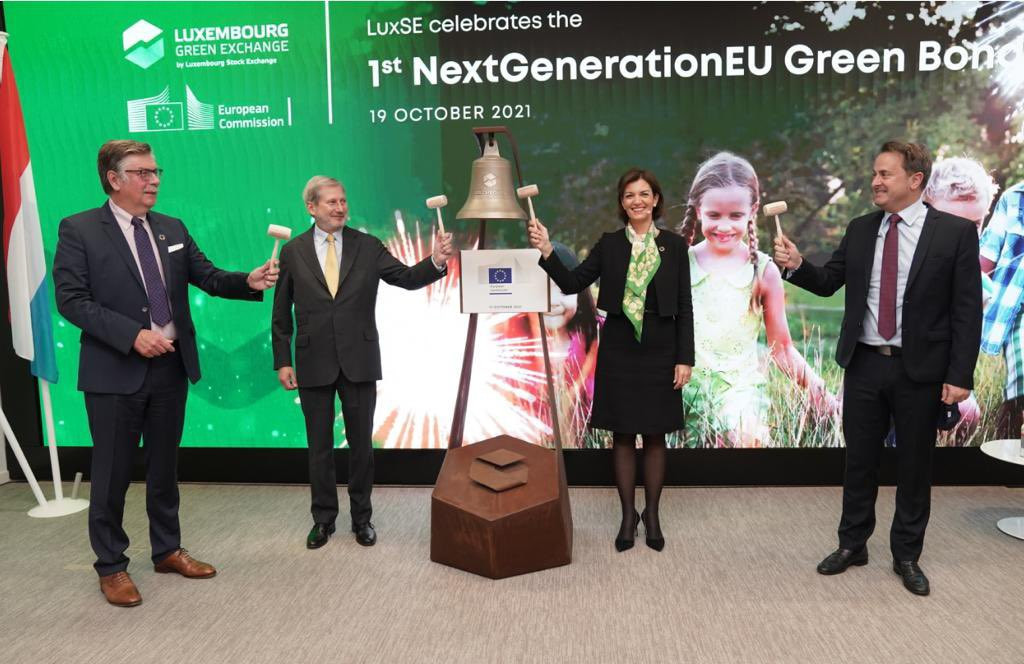The commission will seek to raise up to 30% of the NextGenerationEU funds through the issuance of NextGenerationEU green bonds and use the proceeds to With the NextGenerationEU green bond programme of up to €250bn by the end of 2026, the EU will become the largest green bond issuer worldwide.
The green bonds are “an opportunity to build back better after the crisis, and to use the means that we have decided to give ourselves to make Europe, healthier, greener, and more digital. A Europe that is fit, in fact, for the next generation,” said Luxembourg prime minister Xavier Bettel (DP) at the event on Tuesday morning.
“Following the guidelines of the European Commission, Luxembourg has made sustainability the main theme of its own national recovery and resilience plan. In Luxembourg, we do not only support the digital and green transition, we even wish to accelerate it,” he said.
The 15-year bond, issued on Tuesday and due on 4 February 2037, was more than 11 times oversubscribed, with books exceeding €135bn. On that basis, the commission achieved excellent pricing conditions. With NextGenerationEU green bonds, the EU is set to become the world's largest green bond issuer by far, providing a significant boost to sustainable finance markets as well as funding a greener EU recovery from the pandemic.
Julie Becker, CEO of the Luxembourg Stock Exchange, highlighted that new sustainable debt insurance may reach US$1trn in 2021 and that the European Union is making a significant contribution to this important milestone.
“Transparency is key”, Becker said. “And with its European green bond framework released last month, the European Commission commits to providing both an allocation and an externally reviewed impact report for its green investments, providing investors with maximum transparency, and this is essential for sustainable finance to continue to grow.”
Quicker response
The NextGenerationEU bonds confirm the commission’s commitment to sustainable finance, accelerating a virtuous cycle of sustainable investments, further boosting the green bond market and strengthening the role of the EU and of the euro in the sustainable finance markets.
The use of the proceeds encompasses nine broad categories of expenditure, including energy efficiency, clean energy, and climate change adaptation. Brussels will track the relevant spending according to the spending roadmaps under the Recovery and Resilience Facility at the heart of NextGenerationEU recovery instrument.
Johannes Hahn, the European commissioner for budget and administration, said the EU was much quicker to act during the pandemic than during the financial and economic crisis 12 years ago, when it took the EU two years to react properly.
This time, “it took us only a couple of weeks, maybe four or five months, that there was a final agreement about how to react, what to provide in terms of financial means. The first issues were the so-called sure bonds, where we initiated support to member states, in particular those who didn't have what we call short-time unemployment schemes or employment schemes, and this was a huge success, we raised almost €100bn for that purpose, and could help many European member states, helping 31 million people, two million companies. I consider this one of the elements that was key to our recovery,” Hahn said.
Bettel during his speech highlighted the urgency of climate change, adding that the NextGenerationEU bonds were designed with the next generation in mind. “When we speak about green finance, when we speak about climate, we should know that five, six years ago, for a lot of us climate change was at the other end of the world. It was images we saw on TV, or it might be in 100 years and 50 years. No, it is today, and it is also here.” Bettel said.
“The Luxembourgish government recognised very early the potential of sustainable, finance, and for many years now we put great effort into promoting sustainable finance. We have also worked with the European Investment Bank and set up the climate finance platform, a trust fund to finance high impact climate action projects, we also created the Climate Fund incubator the international climate finance accelerator to help start-up climate fund managers to grow,” he said.
The Luxembourg Stock Exchange celebrated the five-year anniversary of its LGX green exchange, the leading platform for sustainable securities, an initiative founded by Becker, that counts 1,100 green social sustainability and sustainability-liked bonds by 210 issuers from 44 countries. The bonds raised more than €570bn for specific green and social projects and sustainable development across the world.
These bonds include the social bonds issued by the European Commission, under the EU share programme to protect employment in member states against the covid-19 pandemic effects, issued 12 months ago together with the prime minister and commissioner Hahn.
